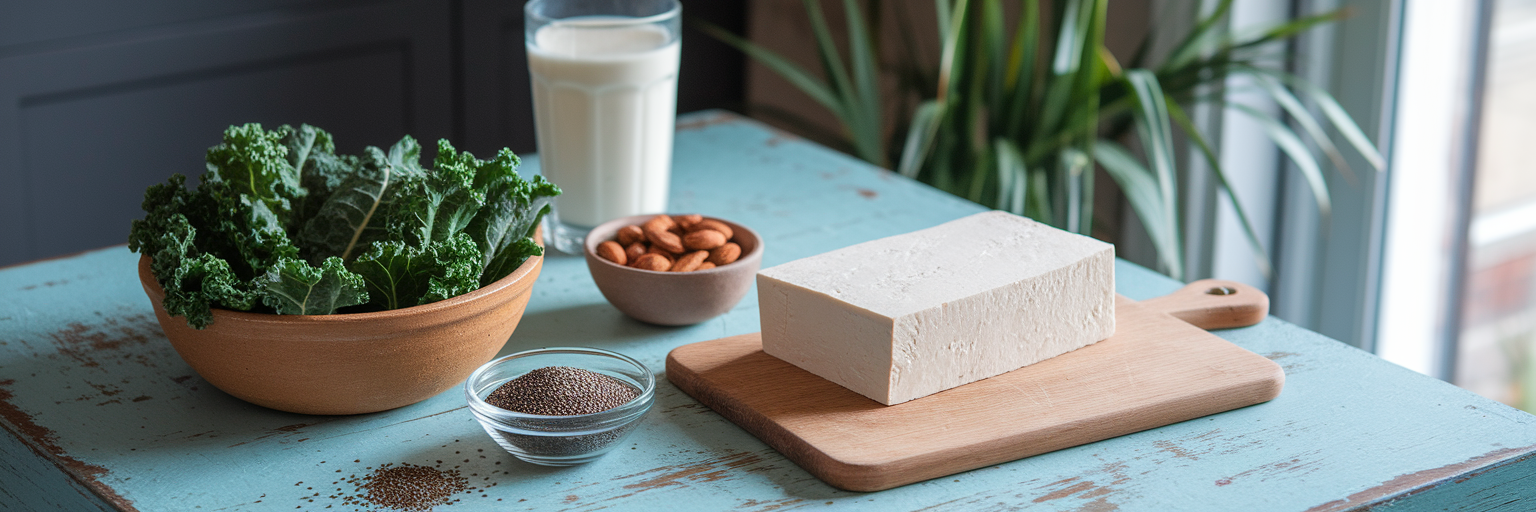Why Your Active Body Needs Protein for Bone Strength
Here’s a fact that might surprise you: protein makes up about 50% of your bone's volume and roughly a third of its mass. We often associate protein with muscle, but its role in our skeletal system is just as critical. Think of your bones like a high-tech building. Minerals like calcium are the concrete, providing hardness and density. But protein is the flexible steel rebar within that concrete, creating a resilient framework that can withstand stress.
For active adults, this framework is constantly being tested. Every run, jump, or lift creates tiny micro-damage in our bones. This isn't a bad thing; it’s a signal for your body to repair and rebuild them even stronger. To do this, your body needs a steady supply of amino acids, the building blocks found in protein. Without enough protein, this crucial repair cycle slows down, leaving bones more vulnerable.
This is where a high-quality plant-based protein comes in. It offers a clean and efficient source of the amino acids your body requires to support not just muscle recovery, but the underlying strength of your entire skeleton. Supporting your active lifestyle means thinking beyond just muscles and focusing on the foundation, and that foundation is built with protein.
The Truth About Vegan Diets and Bone Density

Let's address a common concern right away: the idea that vegan diets might be bad for your bones. It’s true that some studies have pointed to a higher fracture risk in certain vegan populations, and ignoring that would be dishonest. However, the issue isn't the absence of animal products. It's the risk of a poorly planned diet that lacks key nutrients.
A well-structured vegan diet can be incredibly supportive of bone health. As noted in a guide by Sharon Palmer, The Plant-Powered Dietitian, the quality of a vegan diet is far more important than the vegan label itself. When you focus on whole plant foods, you’re not just getting protein; you’re also consuming a rich array of antioxidants and anti-inflammatory compounds.
Chronic inflammation can interfere with bone turnover, the natural process of breaking down old bone and replacing it with new tissue. A diet rich in fruits, vegetables, nuts, and seeds helps create a better internal environment for your bones to thrive. So, the conversation around plant based protein bone density isn't about avoiding risk. It's about proactively building a stronger, more resilient body with a thoughtful, whole-foods approach.
Essential Nutrient Partners for Your Vegan Protein
Protein doesn't work in isolation. To truly support your bones, it needs a team of essential nutrients working alongside it. Think of it as a construction crew where every member has a specific job. A high-quality vegan protein for bone health is the foreman, but it needs its crew to get the job done right.
Calcium and Vitamin D: The Bone-Building Duo
Calcium is famous for its role in bone health, providing the hardness and density we need. But Vitamin D is the gatekeeper that allows your body to absorb and use that calcium. Without enough Vitamin D, calcium can't do its job effectively. Fortunately, getting enough calcium for vegan athletes is straightforward with the right foods.
- Fortified plant milks (almond, soy, oat)
- Calcium-set tofu
- Leafy greens like kale and broccoli
- Fortified orange juice
For many people in the United States, especially in northern regions, sunlight alone doesn't provide enough Vitamin D, making supplementation a smart choice.
Vitamin B12 and Zinc: The Unsung Heroes
Vitamin B12 is crucial for the function of osteoblasts, your primary bone-building cells. Since B12 is not found in plant foods, it is a non-negotiable supplement for anyone following a vegan diet. Zinc is another key player, contributing to bone tissue renewal and mineralization. You can find it in beans, nuts, seeds, and whole grains.
Magnesium and Omega-3s: The Support System
Magnesium is another vital team member, helping to convert Vitamin D into its active form so it can do its job. It's abundant in plant-based foods like almonds, spinach, black beans, and avocados. Meanwhile, plant-based omega-3 fatty acids, found in flaxseeds, chia seeds, and walnuts, help manage inflammation, creating a healthier environment for bone maintenance. Incorporating these foods is simple, and you can find delicious inspiration in some of our favorite 3 easy vegan protein recipes you'll actually crave.
How to Choose a High-Quality Vegan Protein Powder

With so many options available, choosing a protein powder can feel overwhelming. The most important factor is ensuring it has a complete amino acid profile, meaning it contains all nine essential amino acids your body can't make on its own. This is easily achieved with powders that blend different plant sources, like pea and rice protein, to cover all the bases.
| Protein Source | Key Benefit | Amino Acid Profile | Good to Know |
|---|---|---|---|
| Pea Protein | Rich in BCAAs, hypoallergenic | High in most essential amino acids, but lower in methionine | Often blended with rice protein to create a complete profile. Great for muscle recovery. |
| Soy Protein | Contains all 9 essential amino acids | Complete protein | Contains isoflavones, which some research suggests may have bone-protective effects. |
| Hemp Protein | Rich in fiber and healthy fats (omega-3s) | Complete protein, though lower in lysine | Offers a more 'whole food' approach with added fiber and anti-inflammatory fats. |
This table compares the nutritional highlights of common vegan proteins. The best choice often depends on individual dietary needs, fitness goals, and potential allergies.
Beyond the protein source, we believe third-party testing is non-negotiable. The FDA doesn't tightly regulate supplements in the US, so certifications from independent groups like NSF International or Informed-Sport are your best guarantee of purity and potency. This verification ensures the product is free from contaminants and actually contains what the label says it does. Ultimately, the best vegan protein for athletes is one that is clean, complete, and trusted. To see what these high-quality options look like, you can explore our complete range of products designed for performance and purity.
Smart Supplementation for Your Active Lifestyle
Once you've chosen a quality protein powder, integrating it into your routine is the next step. While there's a lot of debate about protein timing, a simple and effective strategy is to have a protein shake within an hour or two after your workout. This helps kickstart the muscle repair process, which in turn supports your skeletal system. But don't stress about hitting a perfect window; consistency is more important than timing.
And remember, protein powder is incredibly versatile. You don't have to limit yourself to shakes. Here are a few easy ways to boost your protein intake throughout the day:
- Mix a scoop into your morning oatmeal or overnight oats.
- Blend it into a smoothie bowl topped with fresh fruit and seeds.
- Stir it into a container of plant-based yogurt for a quick snack.
- Use it in recipes for homemade energy balls or protein pancakes.
Most importantly, view your protein powder as a supplement to, not a replacement for, a diet rich in whole foods. The foundation of vegan protein for bone health is and always will be a varied, nutrient-dense eating plan. For more tips and ideas, you can always check out our blog.
Building a Resilient Body and Bones
Supporting your long-term health doesn't have to be complicated. By focusing on a few key principles, you can build a resilient body from the inside out. Remember that protein provides the essential framework for your bones, giving them the flexibility they need to handle an active life. A well-planned vegan diet, rich in whole foods, is a powerful way to support your bone density for years to come.
Finally, pairing your protein with nutrient partners like calcium, Vitamin D, and magnesium ensures your body has everything it needs. Feel confident and proactive about your health. If this was helpful, share it with an active friend who might benefit. If you're ready to start, consider exploring a clean, third-party tested option like our chocolate vegan protein to support your journey.



